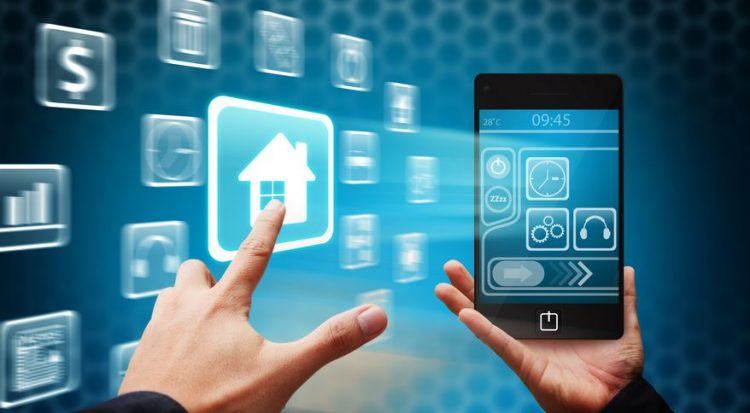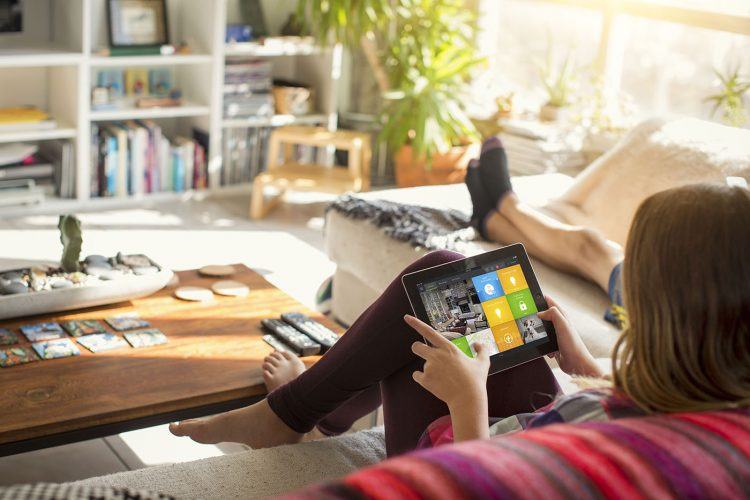
With the continued development of smart home technology, regular homes are being transported into the 21st century with more of the mundane tasks being automated for convenience purposes as well as to save on water and electricity. The idea of the fully-automated smart home is for all of the appliances to talk to one another so the house can complete the mundane tasks for you in the most efficient way possible.
Although there are many individual smart home products available, technology is not yet at the stage where the entire home can be automated. The smart home industry is a little chaotic at the moment with many companies who sell one or two items vying for shelf space and consumer purchases.
Technology that makes us Lazier
There are certainly a variety of smart home devices that make us lazier.
Amazon Echo
Amazon Echo is the ultimate product for the lazy at the moment. The product is a speaker that can be placed anywhere in the house. It has the functionality to control smart hubs within the home. Also, the product is voice controlled allowing you to set calendar dates, so you do not need to remember; answer questions you ask, so you do not need to look them up; set dinner reservations; order Ubers; plays music on demand and provides the weather. Think of the Amazon Echo as a personal digital butler that, despite all of this functionality, significantly adds to our laziness.
Smart Light Bulbs
First, smart light bulbs can be programmed once to turn off and on at specific times. Long gone are the days of setting manual timers and hoping that they work while on vacation. Instead, you simply set the timers using the smart home hub and the light bulbs will turn on and off for their entire life cycle. Although this technology may make us lazier, it also boasts many benefits.
The days of forgetting to turn off the lights when leaving for work or a week-long trip are behind us. Smart light bulbs can be programmed to turn off and on while you are on vacation or even controlled via smart phone. This saves electricity, which is better for the environment and your wallet, and improves security within your home. Lights turning off and on throughout the day will give the appearance that someone is home.
Smart Thermostat
The smart thermostat works in a similar way as the smart light bulb. The temperature of the residence can be programmed once and adjusted throughout the day to maintain a constant temperature or decrease while at work and increase when home. Also, air conditioners can be programmed to start a half hour prior to arriving home from work so that it is cool when you walk in the door. Again, this results in less electricity being use which is better for the environment and monthly utility bill.
Smart Security Cameras
Home security cameras have come a long way in technology and affordability. These products are constantly running and monitoring your home which can be accessed at any time via smartphone app. However, many of these new cameras will start recording once major motion (not from a pet) is detected within the room or the smart alarm goes off. This saves electricity from not having the cameras recording at all times and only when necessary.
Smart Locks
Smart locks are installed locks on the doors that can wirelessly open the door from your smart phone app with physical lock backup. Some of these smart locks have a personal key fob censor that utilizes Bluetooth technology to open the door when within range. This type of product allows us to be lazy with not needing to remember to bring our house keys but is beneficial for added security.

Current Status of the Smart Home
While all of these products sound great, you must purchase them piecemeal at the moment. First you buy and setup the hub, then you add in the lights then connect the door then add the security cameras. A fully-automated smart home is not yet widespread due to the many purchases that need to be made and the number of small companies manufacturing these items. At the end of the day, people really do not have time to put all of this together.
Recently purchased by Google, the NEST brand of digital thermostats really made the smart home idea cool. This was an idea that has not really been considered since the Jetsons. NEST has been able to shape consumer opinion and branched out to other smart home products. Unfortunately, they never offered an entire system so hopefully Google can make that happen in the future.
Future of Smart Home Technology
In order for smart home technology to really take off, the larger companies need to step in and take the lead to consolidate from the piece meal product system. The issue with buying into these numerous small startups is they may not be supported in two years and you have just spent thousands to try to automate your home. Smart home technology will never truly be feasible until the large and secure companies step in to provide a collaborative solution.
In the future, these larger companies will provide entire systems to home improvement stores or directly to contractors who will either install the system into current homes or add it during the initial construction phase. This will eliminate the concern with companies going out of business and compatibility between third-party components. Also, it is perfectly feasible to expect voice command digital butlers, similar to Amazon Echo or iPhone’s Siri, built directly into the home and accessible from any room; maybe even outside in the yard.
Future Concerns
There are two primary issues that will need to be addressed with future smart homes. First, what happens during an electricity blackout? Since all of these devices are contingent upon electricity, you will be locked out of the house, the security system will not work and the thermostat will shut off. It is unreasonable to expect resident’s to purchase backup power. However, building backup power into the home may be a solution.
The second issue is data security. With all of these devices running from wireless, data security will need to significantly improve. The industry is becoming more aware of this requirement and there are companies developing improve encryption and other software technologies.
The smart home industry is at a very confusing place at the moment which is why it needs a large company to set the standard. There are too many small companies that are popping up and going out of business or being acquired a short time after. Once consolidated into entire systems, let the home laziness begin!


One Ping
Pingback:Household Chore Hacks for Lazy People | Fine Feather Heads